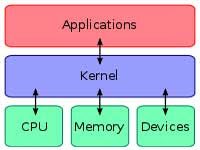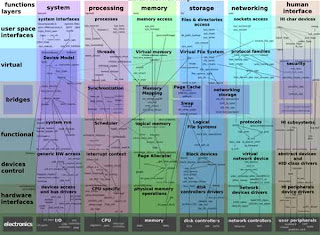The Linux kernel is an operating system kernel used by the Linux family of Unix-like operating systems. It is one of the most prominent examples of free and open source software.
 The Linux kernel is released under the GNU General Public License version 2 (GPLv2), (plus some firmware images with various licenses), and is developed by contributors worldwide. Day-to-day development takes place on the Linux kernel mailing list.
The Linux kernel is released under the GNU General Public License version 2 (GPLv2), (plus some firmware images with various licenses), and is developed by contributors worldwide. Day-to-day development takes place on the Linux kernel mailing list.The Linux kernel was initially conceived and created by Finnish computer science student Linus Torvalds in 1991. Linux rapidly accumulated developers and users who adopted code from other free software projects for use with the new operating system. The Linux kernel has received contributions from thousands of programmers. Many Linux distributions have been released based upon the Linux kernel.
 The kernel is the central component of most computer operating systems; it is a bridge between applications and the actual data processing done at the hardware level. The kernel's responsibilities include managing the system's resources (the communication between hardware and software components). Usually as a basic component of an operating system, a kernel can provide the lowest-level abstraction layer for the resources (especially processors and I/O devices) that application software must control to perform its function. It typically makes these facilities available to application processes through inter-process communication mechanisms and system calls.
The kernel is the central component of most computer operating systems; it is a bridge between applications and the actual data processing done at the hardware level. The kernel's responsibilities include managing the system's resources (the communication between hardware and software components). Usually as a basic component of an operating system, a kernel can provide the lowest-level abstraction layer for the resources (especially processors and I/O devices) that application software must control to perform its function. It typically makes these facilities available to application processes through inter-process communication mechanisms and system calls.Operating system tasks are done differently by different kernels, depending on their design and implementation. While monolithic kernels execute all the operating system code in the same address space to increase the performance of the system, microkernels run most of the operating system services in user space as servers, aiming to improve maintainability and modularity of the operating system. A range of possibilities exists between these two extremes.
Tags:
learning linux, linux unix, linux courses, unix training, using linux








